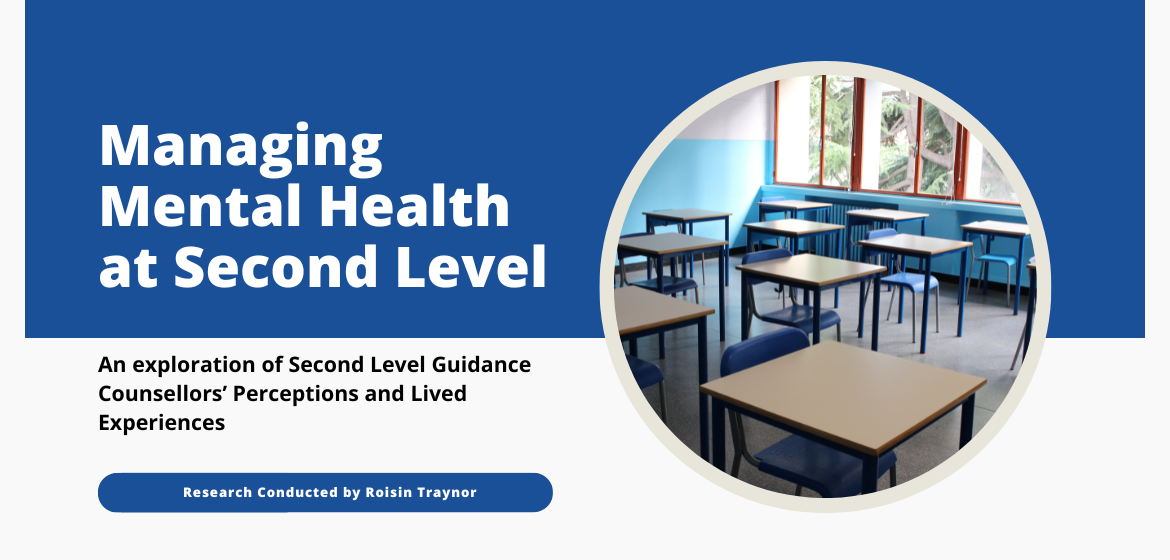
Managing Mental Health at Second Level: An exploration of Second Level Guidance Counsellors’ Perceptions and Lived Experiences
Roisin Traynor a graduate here at ICHAS recently completed research on managing mental health at second level: an exploration of second-level guidance counsellors’ perceptions and lived experiences of seeking to meet student mental health needs. Her findings recently featured in the Irish Journal of Counselling and Psychotherapy.
The role of the Second Level Guidance Counsellor is a broad one. Arguably, counselling for mental health is just a part of their role and we want to explore how Guidance Counsellors’ assess their ability to perform this part within a school setting. In terms of counselling for mental health within the role of a Guidance Counsellor, the Department of Education has defined this as part of the role as, being offered for development and personal crisis as well as to empower students to “make decisions, solve problems, address behavioural issues, develop coping strategies and resolve difficulties they may be experiencing.” (Hayes et al. 2011). What are the perceptions and lived experiences of the Guidance Counsellor in looking to meet these needs?
Research Findings on Managing Mental Health at Second Level
- Guidance Counsellors’ experience with outside referrals
- Continuous Professional Development and differences within initial training
- Dual role of Guidance Counsellor and teacher
- The “holding space”
- Challenges faced in relation to cuts
From the research, we now know Guidance Counsellors feel the “holding space” can be of use to the students. It can benefit students by being a familiar space where outside travel is not required and it is an effective way to help students when they are on long waiting lists. However, most participants discussed the negatives associated with this. Guidance Counsellors have described issues such as feeling like they are picking up the pieces when outside services are telling the students, “There is nothing we can do to help.” The skills and knowledge of the Guidance Counsellors comes up here, and while there is no literature to back it up, participants felt strongly about only having the ability to help students to a certain level. Often, students who are in this holding space, require more professional skills. Clinical supervision may be of benefit here.
The role of Guidance Counsellors is hindered by the long waiting lists for outside referrals. This leads to frequently using an already-busy schedule to ‘hold’ students when they have already been referred on due to complex issues. In particular, the evidence from literature supports findings that outside referrals may need to operate more effectively to help Guidance Counsellors, but more importantly, to help the students. Another point within this theme that was highlighted within the literature is students’ experience with outside referrals. Guidance Counsellors who participated in this study also expressed concerns about students’ experiences with the service and examples of the reality of dealing with such services. There were questions as to whether this service that provides assessment and treatment for young people experiencing mental health difficulties was working as effectively as needed for school students. This is a significant finding as it was discussed by participants the most.
The literature and findings also bring the question of whether Guidance Counsellors should be teaching. Despite the fact Guidance Counsellors are required to have teaching qualifications in Second Level, the dual role of Guidance Counsellor and teacher is evident to be disliked by Guidance Counsellors and students. As we know from this study, all Guidance Counsellors interviewed are also qualified in another subject. Four out of five participants mentioned how being in the dual role caused a loss of love for their original subject. They also discussed how teaching affects their ability to be a Guidance Counsellor and the difficulty in the classroom being the teacher.
 Concluding Thoughts
Concluding Thoughts
The research acknowledges a more effective working system is needed within the Irish Health Care system for those at school in Second Level. The researcher agrees with Lisa Molloy from the Irish Association for Counselling and Psychotherapy (IACP), that the Government needs to start prioritizing mental health in schools. The IACP suggest launching school-based therapeutic counselling to prioritize mental health in schools. Senator Colette Kelleher recently presented this idea along with IACP in Leinster House and propositioned a new project called Pathfinder. This proposal of Pathfinder asks the government for funding to enable school-based counselling interventions (IACP, 2019). Due to the findings of this research, it seems that Guidance Counsellors and most of all, students, would benefit from a prioritisation of mental health within Second Level schooling. The researcher would like to recommend such initiatives in mental health and counselling services.
Roisin was also asked a couple of questions when it comes to the dissertation itself
How did you choose the topic of Mental Health at Second Level for your dissertation?
“This is a topic I am very passionate about. Having worked as a guidance counsellor I have first-hand experience with the reality of the position and wanted to explore other guidance counsellors challenges. Looking at the lack of literature, I felt research in this would be beneficial to understanding the realities of secondary school.
What was the biggest lesson you took from doing the dissertation itself?
Being an “academic” is not everything. My marks for my dissertation result were not high, however, the research question itself allowed for common themes to emerge that provided more evidence in the field of guidance counselling.
What advice would you give to anyone looking to undertake theirs?
Other than starting as early as possible and giving yourself plenty of time, I would advise students to base their dissertation on something they are genuinely interested in. It can be a difficult few months with scribing etc. So I can’t imagine not having a passion for the topic you are researching. In my case, it was also to see if other guidance counsellors had similar experiences and a way to channel my frustrations.
Róisín holds a BSc in Education and Training, a Postgraduate in Career Guidance and a Master’s from ICHAS in Counselling and Psychotherapy. She has always had a keen interest in mental health and education. Róisín has worked as a Guidance Counsellor in a variety of different schools in Ireland and abroad. Currently, she works as a Mental Health Officer at Meath Partnership and is passionate about evoking change within education, for example making the role of Counsellor prominent in a school setting and separate from the role of Guidance Counsellor. You can contact Róisín at Róisínnealatraynor@gmail.com.
























